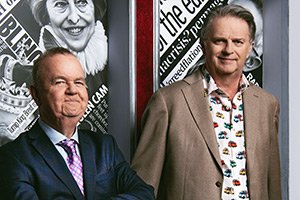About Have I Got News For You

Have I Got News For You - HIGNFY - can quite rightly be described as British television's most successful comedy panel show.
Originally broadcast on BBC Two before transferring to BBC One, the programme is known for steering close to the edge of complex political topics (particularly controversial and even libellous ones), whilst still managing to appeal to the masses. Much of the credit must go to the regular team captains: the surreal improvisational comedian Paul Merton, and the editor of the satirical magazine Private Eye, Ian Hislop.
History
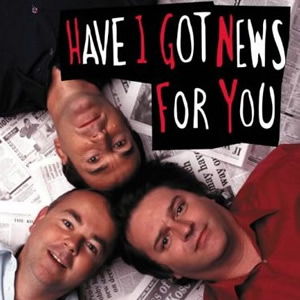
Have I Got News For You started life as an unbroadcast pilot episode hosted by John Lloyd, creator of BBC Radio 4's satire The News Quiz and the more recent panel game QI. The pilot, called John Lloyd's Newsround worked, but Lloyd was not keen on continuing his role. Out of a choice between Sandi Toksvig and Angus Deayton, it was the latter that got the job and became host: reportedly (in 2015) due to BBC bosses not feeling that a woman could host such a show. The first series appeared on BBC Two in 1990, with Deayton in the middle, and Toksvig guesting on Hislop's team.
HIGNFY ran for 19 series on BBC Two before moving to BBC One in 2000. Throughout the BBC Two run, Deayton and Hislop appeared in every episode. Merton appeared in almost all the episodes, but during the 11th series in 1996 he took a break (during which the other side was composed of two guests, with Eddie Izzard appearing the most frequently).
When the series graduated to BBC One, there was some fear that the move to a more mainstream channel would result in a change of the show's content and a "dumbing down". Deayton made reference to this at the start of the first BBC One show, saying that the content would not be affected, after which a parade of Tiller Girls danced onto the set and Deayton continued: Good evening, I'm Carol Smillie.
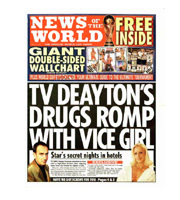
It was during 2002 that the most notable moments in the show's history occured. The News of the World reported that Angus Deayton had an adulterous affair with a prostitute and had taken illegal drugs. Not surprisingly, Deayton was the victim of just about every joke in the episode that followed. Hislop even brought a copy of the newspaper with him, which he began reading. Merton meanwhile had gone to the trouble of having the front page of the paper printed on a t-shirt.
Deayton survived the series, but further allegations were printed later and, after much discussion between the BBC and Hat Trick Productions, he was sacked on the 22nd October 2002 - days before the third episode of the 29th series. In a statement at the time, a spokesman for the BBC explained the reasoning behind the sacking as follows: It is felt by all concerned that continuing stories in the media about Angus's private life have made him the subject of headlines rather than a commentator on them. This has made his position as host of the topical news quiz untenable.
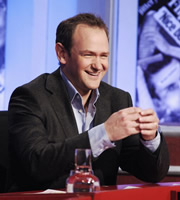
Since Deayton's departure, each episode has been presented by a guest presenter. The first was Merton, mainly because there was too little time to find someone else. Alexander Armstrong, Jo Brand, Jack Dee, Jeremy Clarkson and Kirsty Young are amongst the most regular guest presenters, but perhaps the most memorable hosts have been Brian Blessed, and Conservative politician Boris Johnson. Audiences loved Boris's bumbling appearances on the show, which are often credited by some with a rise in his popularity and eventual election to the office of Mayor of London for two terms (2008 - 2012, and 2012 - 2016).
To date, the show continues with weekly guest hosts, but it is known that Alexander Armstrong has been considered as a potential permanent replacement.
For a number of series from 2007, HIGNFY branched out onto the internet with a series of video podcasts called The Inevitable Internet Spin-Off. Merton often commented that these webisodes were not as good as the TV version because they are presented in a "tiny screen".
Joke Targets
HIGNFY has a series of targets it likes to mock with particular frequency. One of the earliest targets was Jeffery Archer, the Conservative MP who became the butt of many jokes after it was alleged that had given money to a prostitute. He was later jailed for perjury, much to Hislop's delight.
Other targets include Labour's John Prescott and the Conservative party's Eric Pickles, whose size and apparently unhealthy diets are often points of fun. Former TV host and Labour politician Robert Kilroy-Silk has also become a figure of ridicule, with embarrassing clips used with particular delight: especially one from his failed ITV game show, Shafted.
Rounds
Each episode normally features the same rounds. The points are usually divided unfairly in Merton's favour. As of the end of Series 35, Merton had won 29 of the series and Hislop has won just 3, with 7 drawn.
The rounds are:
- Round One: The first round looks at the biggest news stories of the week. This normally takes the form of a film clip giving the panellists clues as to what a given story is.
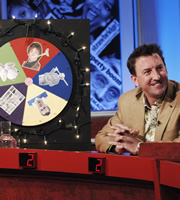
- Round Two: Originally Tabloid Headlines, in which the clue to the story was the headline from a tabloid newspaper, this round now varies between episodes but is usually a further variation on identifying a news story from a clue. Recent formats to appear here include Picture Spin Quiz. where the panel are shown a picture which spins and zooms out slowly; the Wheel of News (pictured) in which a wheel representing different stories is spun; The One Armed Bandit of News, which gives a picture clue in the form of a slot machine; and The Strength-o-meter of News, which looks like a fairground test-your-strengeth machine. Sometimes, the round is altered to suit the guests, host, or a significant news event. For example, when Magnus Magnusson appeared, the panel played Mastermind.
- Odd One Out: In the third round the panel are shown four pictures, with three of them having a very obscure link. The panel have to figure which is the odd one out and why. This is sometimes replaced by the Connections Round in which the panel have to try and find out what connects three people.
- Missing Words: The final round features a selection of newspaper headlines with some of the words removed. The panel have to guess what the words are. To make things more difficult, this round usually takes some of the headlines from an obscure guest publication. Examples have included Potato Storage International, The Tightwad Gazette and The Journal of Plankton Research.
- Caption Competition: This is a special prologue round sometimes played after the game has finished. The panel are shown amusing pictures and asked for a caption for each. No points are awarded.
Controversy
Not surprisingly for a topical satirical television series, HIGNFY has had its share of controversial moments. In 1996, the BBC and Hat Trick Productions were fined £20,000 for contempt of court after Deayton said on the show: The BBC are cracking down on references to Ian and Kevin Maxwell, in case programme-makers appear biased in their treatment of these two heartless, scheming bastards.
Another court case was brought against the programme by Conservative MP Rupert Allason when in the book Have I Got 1997 For You published the following: "...given Mr Allason's fondness for pursuing libel actions, there are also excellent legal reasons for not referring to him as a conniving little shit." Allason lost the case.
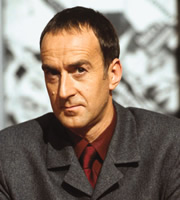
Deayton's departure from the show, mentioned above, caused a lot of controversy. Many of the audience did not want him to go, but the BBC pushed ahead and sacked him anyway. After Deayton left, Stephen Fry said that he would never appear on the show again, commenting that the decision to sack him was greasy, miserable, British and pathetic
.
Another person who has ruled out appearing on the show again is Will Self. Once a frequent guest, the novelist said in 2007: I'm afraid that without the reality element, the programme has become just like any other pseudo-panel contest, where funny fellows sit behind desks cracking jokes. Moreover, in the post-Hutton Inquiry era, the BBC seems to have lost its bottle so far as edgy satire is concerned: the sharpest crack I made all evening - and the one that received the most audience laughter - was cut for transmission.
The week before Self's last appearance, the show was hosted by Ann Widdecombe. She also said that she would not return as host after guest panellist Jimmy Carr kept on making risqué jokes about her. Widdecombe said of the stand-up: His idea of wit is a barrage of filth and the sort of humour most men grow out of in their teens. There's no amount of money for which I would go through those two recording hours again. At one stage I nearly walked out.
From time-to-time HIGNFY also finds itself defending accusations of sexism. The latest, in May 2008, saw Mariella Frostrup describing the panel game as a 'disgrace'. In an interview, the presenter said that women were invited to appear only as a token presence to be ridiculed by the testosterone-driven
team captains. However, her comments were immediately knocked down by Germaine Greer, one of the many women to have appeared on the programme. She responded in The Daily Telegraph, saying: Mariella might ask herself why they asked her on in the first place. She's not known for being amazingly witty, is she?
Other complaints have also been made about the choice of guests. Some have complained that UKIP leader Nigel Farage has appeared on the show too many times and thus have the accused HIGNFY of bias.
Foreign Adaptations
Many programmes based on the Have I Got News For You format can be seen abroad. Here is a list of the most similar:
- Dit was het nieuws (That Was The News) - Dutch
- Uutisvuoto (Newsleak) - Finnish
- Good News Week - Australian
- Snacka om nuheter - Swedish
- Nytt På Nytt (The News Anew) - Norwegian
- Mishak Makhur - Israeli
- Don't Feed the Gondolas - Irish
- 7 Tage, 7 Köpfe (Seven Days, Seven Heads) - German
- News, Views & Confused - Pakistani
- Þetta Helst (Top Stories) - Icelandic

